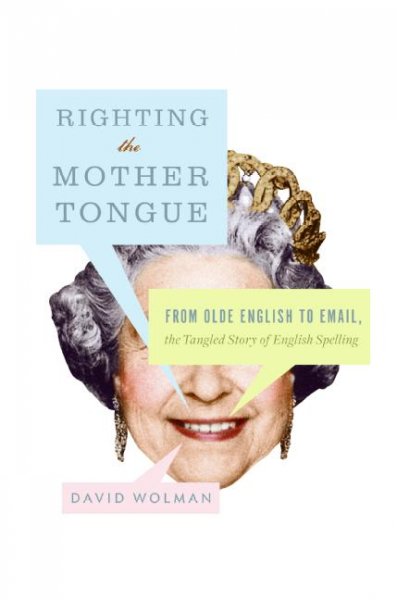The noted theologian John Dominic Crossan will be a guest on New Albany Now in the coming weeks to discuss his recent book, God and Empire: Jesus Against Rome, Then and Now. Read more on our New Albanist blog.
Saturday, August 30, 2008
Spelling snob
 I confess. I'm a spelling snob.
I confess. I'm a spelling snob.
I've been thinking about this lately while reading David Wolman's Righting the Mother Tongue: From Olde English to Email, the Tangled Story of English Spelling. Click on the cover photo for more information.
Wolman "suffered" the tyranny of difficulty with spelling as a child, and still carries scars from a quizmistress mother and spelling-segregated classrooms.
During the writing of this book, Wolman visited with a diagnostician, Dr. Uta Frith, who appraised him, tentatively, as a classic case of compensated dyslexia. Frith is the opposite of a bad speller, but "[s]he's adamant that spelling skill has nothing to do with being gifted. 'It's a waste of [mental] resources to learn all that spelling if you don't need it,' she said. 'The fact is you can't help being good or bad at this.'"
According to the author, "The evolution of written symbols, words, and prose is far too recent in human history to be coded into our genes. Instead, the brain has retooled itself for reading and writing, applying, for instance, visual processing powers that evolved for other tasks...the reading system is more tenuous than many of us realize...Reading may be a favorite form of leisure, but for the brain it's no walk in the park."
And yet, society as a whole uses the ability to spell as a shorthand for intellect, or at least for education. Wolman tells the story of an 18th-century "man of quality, who never recovered from the ridicule of having spelled wholesome without the w."
"Spelling as a measure of manners, we know. Spelling as a sign of intelligence, we infer. Think about the last time you read a formal letter with misspellings in it and the unfavorable impression it left behind, not just of carelessness, but also lack of smarts. 'Spelling,' David Crystal told [the author], 'has become the main diagnostic feature for determining whether someone has been educated in English.'"
So, I'm a spelling snob. I've always been good at it. I attribute that to the importance I place on being thought of as "smart." I was "rewarded" for being smart, and spelling was where I excelled, so naturally it became important to me. Today, I cringe when I see misspellings and grammatical groaners like "they was." You can imagine my internal pain during a typical city council meeting!
But, I don't consider myself the spelling police. I groan inwardly. When I think it will be both helpful, and taken as helpful, I'll drop a note to a friend to "help" them over a word they've written that is not orthographically correct.
Much of the book is taken up by recitals of the efforts of spelling reformers, those "valiant exterminators of dialectical vermin," from Samuel Johnson to Noah Webster to Melville Dewey (father of the Dewey Decimal System, who went so far as to change his name to Melvil Dui).
As an end note, consider this anecdote that may explain why I was nurtured to be a good speller. My mother was a tremendous speller. For instance, she could throw a newspaper page down on the kitchen table and within seconds spot the typos without consciously reading a word. My father could sit on the front porch and point out four-leaf clovers from 20 and 30 feet away in the midst of a lawn full of thick grass...not just clovers, but four-leaf clovers. But he couldn't spell a lick. And for the most part, never worried too much about it.
As a girl in school, my mom was dismissed from a spelling bee after spelling catalogue. The judges said oh, no. It's catalog. Period. This despite the fact that almost everything my mother had read spelled it with the -ue ending. Know who was responsible for that little change? Mr. Melvil Dui.
Wednesday, August 27, 2008
Randy has transitioned all of his blogging - show-related, political, books, and other - over to a new site. If you want to, check it out and add it to your favorites and blogrolls.
It is http://newalbanist.wordpress.com/
This blog isn't going away. It's just being joined to a meta-blog.
It is http://newalbanist.wordpress.com/
This blog isn't going away. It's just being joined to a meta-blog.
Subscribe to:
Comments (Atom)


